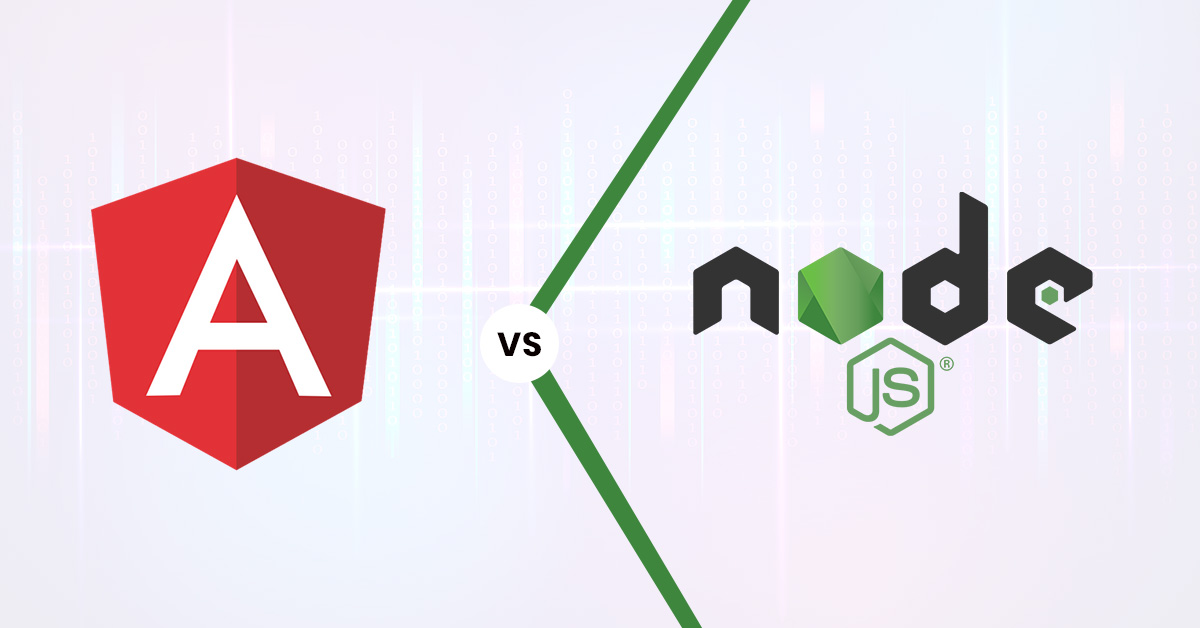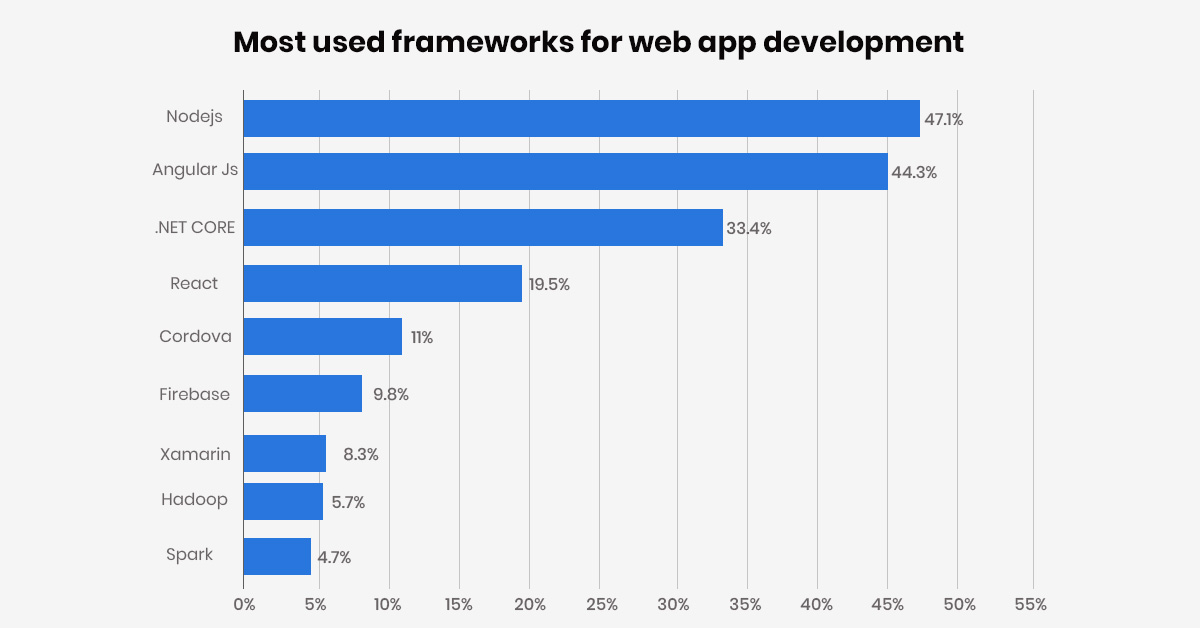 ChatGPT
ChatGPT
 Grok
Grok
 Perplexity AI
Perplexity AI

4 min read | By Admin | 25 January 2022 | Frameworks
As the web has become commonplace in every work environment around the world, web apps have become an inevitably significant tool for business. Web apps furnish you to streamline your business reach so that you can achieve more in less time with more significant accuracy.
Dissimilar to various other development tools, app development frameworks offer pre-defined coding sites and guidelines to expedite seamless web development. Simultaneously, it will speed up the development process and shorten the market time by shortening the app development life cycle.
For web app languages Node js and Angular js are being most popular and are developed to build web apps using JavaScript. Angular js and Node js are both comprehensively used an open-source JavaScript-based technologies.
AngularJS is a JavaScript framework, while NodeJS is a cross-platform runtime environment. Angular enables developers to create dynamic web apps based on model-view-controller architectural patterns and using HTML as a template language.
Concurrently, NodeJS assists developers to use JavaScript as a server-side programming language to create efficient server-side applications. Therefore Node js and Angular follow the syntax of JavaScript but they are quite different in their category of architecture, functionality, performance, usage, and working.
To choose the bestest in Angular js vs Node js for web apps development in 2022, the difference between Angular js and Node js are as follows.

Node.js is an open-source, server-side platform built on Google Chrome’s JavaScript Engine runtime (V8 Engine) for easily building fast and scalable web apps.
Node.js uses an event-driven, non-blocking I/O model that makes it lightweight and efficient, perfect for data-intensive real-time applications that run across distributed devices.
➤Programming languages used: JavaScript
➤Developed by: Ryan Dahl in 2009
➤Type: Runtime system
Node.js applications are written in JavaScript and can be run within the Node.js runtime on OS X, Microsoft Windows, and Linux. Node.js also affords a rich library of various JavaScript modules which simplifies the development of web apps using Node.js to a great extent.
𝐀𝐬𝐲𝐧𝐜𝐡𝐫𝐨𝐧𝐨𝐮𝐬 𝐚𝐧𝐝 𝐄𝐯𝐞𝐧𝐭-𝐃𝐫𝐢𝐯𝐞𝐧: All APIs in the Node JS library are asynchronous, that is, disabled. It basically waits until the Node.js-based server provides the API data. The server moves to the next API after calling it, and the Node.js event notification mechanism enables the server to receive a response from the previous API call.
𝐒𝐢𝐧𝐠𝐥𝐞 𝐓𝐡𝐫𝐞𝐚𝐝𝐞𝐝 𝐛𝐮𝐭 𝐇𝐢𝐠𝐡𝐥𝐲 𝐒𝐜𝐚𝐥𝐚𝐛𝐥𝐞: Node js uses a single-threaded model with event looping. The event mechanism helps the server to respond in a non-blocking way and makes the server highly scalable as opposed to traditional servers which create limited threads to handle requests.
𝐍𝐨 𝐁𝐮𝐟𝐟𝐞𝐫𝐢𝐧𝐠: Node js apps never buffer any data. The applications simply output the data in chunks.
𝐕𝐞𝐫𝐲 𝐅𝐚𝐬𝐭: Being built on Google Chrome’s V8 JavaScript Engine, Node.js library is very fast in code execution.

AngularJS is an open-source and structural web application framework for dynamic web applications. It lets you use HTML as the template language and let’s extend HTML’s syntax to express your app components clearly and succinctly.
Its data binding and dependency injection eliminate much of the code you currently have to write. And it all happens within the browser, making it an ideal partner with any server technology.
➤Programming languages used: JavaScript
➤Type: Web framework
➤Developed by: Misko Hevery and Adam Abrons in 2009
AngularJS is an efficient framework that can create rich web apps AngularJS offers developers an option to write client-side applications using JavaScript in a clean Model View Controller (MVC) way.
Applications written in AngularJS are cross-browser compliant. AngularJS automatically handles JavaScript code suitable for each browser.
𝐃𝐚𝐭𝐚-𝐛𝐢𝐧𝐝𝐢𝐧𝐠: AngularJS is the automatic synchronization of data between model and view components.
𝐒𝐞𝐫𝐯𝐢𝐜𝐞𝐬: AngularJS comes with several built-in services such as http to make XMLHttpRequests.
𝐌𝐨𝐝𝐞𝐥 𝐕𝐢𝐞𝐰 𝐖𝐡𝐚𝐭𝐞𝐯𝐞𝐫: MVW is a design pattern for dividing an application into different parts called Model, View, and Controller, each with distinct responsibilities. AngularJS does not implement MVC in the traditional sense, but rather something closer to MVVM (Model-View-ViewModel).
𝐃𝐞𝐩𝐞𝐧𝐝𝐞𝐧𝐜𝐲 𝐈𝐧𝐣𝐞𝐜𝐭𝐢𝐨𝐧: AngularJS has a built-in dependency injection subsystem that helps the developer to create, understand, and test the applications easily.


Dissimilar to Node js, AngularJS is a web framework. You can use the web framework to automate common development tasks while developing a variety of websites, web apps, and web services.
The developers cannot utilize Node JS as a web framework for their development project. But they have an option to choose from a wide range of Node js based frameworks such as; Socket.io, Hapi.js, Meteor.js, Express.js, and Sails.js.
AngularJS was developed by Google as a web app development framework. Unlike other JavaScript frameworks, Angular is written completely in JavaScript.
It follows JavaScript syntax rules. NodeJS was developed as a cross platform runtime environment based on Google’s V8 JavaScript engine. It was written in a number of programming languages like JavaScript, C, and C++.
Node is designed to build scalable web servers and applications. However, the NodeJS team has recently added the feasibility of mobile app development.
Angular is developed to create dynamic web app development and also it is a perfect framework for structured mobile and desktop apps.
Angular apps are modular and it has a modularity system named NgModules or Angular modules. Any app has a minimum of one root module that allows bootstrapping and generally has more quality modules.
For Node, modules are facilitated for networking (HTTP, DNS, or TCP), file system I/O, data streams, binary data, cryptography functions, and other crucial functions.
Node JS and AngularJS support a number of programming languages in addition to JavaScript. NodeJS supports Ruby, CoffeeScript, and TypeScript, whereas AngularJS supports CoffeeScript, TypeScript, and Dart.
Both JavaScript-based technologies even support a number of commonly used programming paradigms.
AngularJS supports object-oriented, functional, and event-driven programming paradigms. At the same time, NodeJS supports object-oriented, functional, event-driven, concurrency-oriented, and sub/pub programming paradigms.
AngularJS basically allows developers and companies to build interactive interfaces in their web applications.
Node JS is a back-end development framework that is used for building fast and scalable server-side apps. Node JS use cases actually differ from building real-time chat apps to live-stream web apps and far more.
AngularJS does not need the installation process. It can be used by merely embedding Angular in the coding process.
It is obligatory to install Node.js in the system to use it for building web apps, as it has a JavaScript runtime environment.
Angular’s MVW architecture supports two-way data binding. Hence, the data of a web app is synchronized automatically between the model and the view. However, Angular does not offer any sort of support or feature to write database queries.
Node JS allows writing database queries even in non-relational databases like MongoDB and CouchDB, which as a result makes it much easier for developers to build web applications.

AngularJS is one of the popular web app frameworks to bolster up exhaustive documentation that can privilege Java developers for finding technical solutions and solving emerging problems swiftly.
And, Node.js will be more favorable for effortless web app development of scalable web servers and apps. Through comparing the difference between Nodejs and Angular, we have seen that both frameworks have their own unique characteristics and differences that will aid in building dynamic and scalable web applications.
Hence both can be used for web app development but based on your app ideas and needs you have to choose the one.
Otherwise, if you need an enthusiastic team to build your web app project, without hesitation Contact Us for our app development services. We’ll amaze you with awe-inspiring outcomes.
AngularJS is a frontend JavaScript framework for building dynamic web applications, while Node.js is a backend runtime environment that allows server-side JavaScript execution.
AngularJS is used to create interactive user interfaces on the client side, while Node.js handles server-side tasks like managing databases, APIs, and real-time communication.
Choose AngularJS for frontend development when you need a robust framework for building dynamic interfaces, and use Node.js for backend development when you want efficient server-side processing.
AngularJS is best suited for single-page applications with complex user interactions, while Node.js excels in building scalable and real-time applications like chat apps, gaming servers, and IoT platforms.
Decide based on your project’s requirements: choose AngularJS for frontend-heavy apps requiring a structured MVC framework, and Node.js for backend-heavy projects that need event-driven, non-blocking capabilities.
Join over 150,000+ subscribers who get our best digital insights, strategies and tips delivered straight to their inbox.